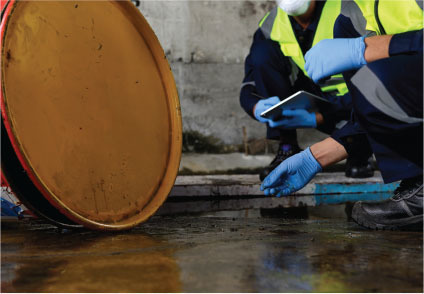August/September 2014
ON ETHICS: YOU BE THE JUDGE
Quid Pro No?
A supplier pays for an engineer to present at a conference—and then asks the engineer to promote their products.
The Situation
Erin Water, P.E., who has expertise in sustainable design issues, is asked by Nick Knackerson, a green building supplier, to make a presentation at an industry educational conference on green building design and related sustainable design issues. Water agrees to participate. Knackerson offers to pay Water’s expenses and Water accepts the offer. Water shares a draft of her remarks with Knackerson. The supplier then requests that Water include within her presentation slides that highlight some of the Knackerson’s green building products.
What Would You Do?
Was it ethical for Water to accept Knackerson’s offer to pay Water’s travel expenses?
Would it be ethical for Water to include within her presentation slides that highlight some of Knackerson’s green building products?
What the Board of Ethical Review Said
Issues related to sustainable design and development are of increasing interest within the engineering profession. The professional practice of engineering has been greatly affected by evolving changes in federal, state, and local mandates; code requirements; technical standards; and changes in professional practice. Several years ago, after discussion and debate, the Board of Ethical Review revised the NSPE Code of Ethics to add a new “professional obligation” (Section III.2.d) encouraging engineers to adhere to the principles of sustainable development in order to protect the environment for future generations.
 Not surprisingly, as with any new practice trend, professional practitioners, consultants, contractors, vendors, and other parties seek to distinguish themselves as knowledgeable and expert in this new area in order to obtain an advantage in the competitive market. Individuals and companies seek to gain credibility and highlight their ability to perform these services in a highly competent manner for the benefit of their clients. One effective marketing technique sometimes used by vendors is seminars that describe the products and services offered by the company.
Not surprisingly, as with any new practice trend, professional practitioners, consultants, contractors, vendors, and other parties seek to distinguish themselves as knowledgeable and expert in this new area in order to obtain an advantage in the competitive market. Individuals and companies seek to gain credibility and highlight their ability to perform these services in a highly competent manner for the benefit of their clients. One effective marketing technique sometimes used by vendors is seminars that describe the products and services offered by the company.
In this case, it is clear from the earlier BER cases that the NSPE Code of Ethics and the earlier cases themselves strongly emphasize the importance that the public and the clients place on professional competence in the area of sustainable development. There was also a concern that an engineer’s judgment could be compromised by a relationship with a vendor whose products or services could be specified by the engineer. As noted in BER Case No. 87-5, while accepting a de minimis gift may not rise to an ethical violation, accepting something of substantial value could raise a serious ethical question. Here, Knackerson is the apparent organizer of the educational session and has offered to pay Water’s travel expenses. While this alone (depending on the amount, meeting location, and other factors) may not amount to substantial value, this offer combined with Knackerson’s subsequent request that Water include slides that highlight some of Knackerson’s green building products suggests an effort by Knackerson to influence Water’s professional judgment in violation of the NSPE Code of Ethics.
Conclusions
It was unethical for Water to accept Knackerson’s offer to pay Water’s travel expenses.
It would be unethical for Water to include within her presentation slides that highlighted some of Knackerson’s green building products.
NSPE Code References
Section II.3.b: Engineers may express publicly technical opinions that are founded upon knowledge of the facts and competence in the subject matter.
Section II.3.c: Engineers shall issue no statements, criticisms, or arguments on technical matters that are inspired or paid for by interested parties, unless they have prefaced their comments by explicitly identifying the interested parties on whose behalf they are speaking, and by revealing the existence of any interest the engineers may have in the matters.
Section III.2.c: Engineers are encouraged to extend public knowledge and appreciation of engineering and its achievements.
Section III.2.d: Engineers are encouraged to adhere to the principles of sustainable development in order to protect the environment for future generations.
“Sustainable development” is the challenge of meeting human needs for natural resources, industrial products, energy, food, transportation, shelter, and effective waste management while conserving and protecting environmental quality and the natural resource base essential for future development.
Section III.5: Engineers shall not be influenced in their professional duties by conflicting interests.
Section III.5.a: Engineers shall not accept financial or other considerations, including free engineering designs, from material or equipment suppliers for specifying their product.
Section III.7.c: Engineers in sales or industrial employ are entitled to make engineering comparisons of represented products with products of other suppliers.
For more information, please see BER Case No. 11-4.


 Volunteering at NSPE is a great opportunity to grow your professional network and connect with other leaders in the field.
Volunteering at NSPE is a great opportunity to grow your professional network and connect with other leaders in the field. The National Society of Professional Engineers (NSPE) encourages you to explore the resources to cast your vote on election day:
The National Society of Professional Engineers (NSPE) encourages you to explore the resources to cast your vote on election day:


